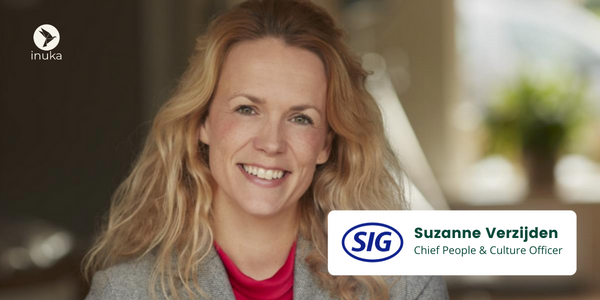Suzanne Verzijden (SIG) on leading employee well-being compassionately: “Leadership plays a crucial role”

This interview is part of a series of interviews with Leaders in Business, HR, Occupational Health, and Well-being. We explore critical aspects of Well-being leadership, with insights to current trends, best practices, how to measure and construct a business case, how should Well-being governance be constructed and much more, resulting in interesting and inspirational insights. Suzanne Verzijden, Chief People & Culture Officer at SIG - a leading packaging solutions provider for a more sustainable world, kicks off.
Suzanne, you are the Chief People and Culture Officer at SIG and part of the Global Executive Board. What is your role in relation to decisions on occupational or employee well-being offerings?
At SIG, we take a holistic approach to supporting mental, emotional and social well-being to enable our employees to lead fuller more productive lives, both at work and at home. We aim to provide employees with a global direction on initiatives, platforms and tools to help them cope with information, emotions, feelings, desires and stressors in a healthy and balanced way. I work with my team to support employee health and well-being with programs to promote work– life balance, healthy lifestyles, mindfulness and smart time management to combat stress and build resilience. As an example, we use the platform of Bookboon to support in learning interventions. Throughout last year we also set up monthly education workshops/sessions on varying well-being topics to stimulate awareness. As a baseline to well-being, it is critical to have an open environment where people feel able to ask for help, hence giving attention to trust-building is important.
The regional and local leadership teams then complement the global approach with support and benefits that vary locally depending on the regional, legal and cultural context. Examples include health insurance, health check-ups, fitness programs, flexible working arrangements, parental benefits and leave, and access to counselling services to address problems at work or at home through employee assistance programmes.

What challenges are you facing regarding mental health in the workplace?
It’s an interesting domain. Mental health in the workplace has changed significantly over the past few years with an increasing prevalence due to the pandemic. People are working from home far more, and a sense of belonging has shifted, underlining the importance once again of the need to collaborate and feel good in their work. I think we will always have a form of hybrid work, and Gen Y and Gen Z increasingly represent the working population who seek flexibility, digital engagement and purpose at work, so building resilience needs a lot of attention.
That is why we have introduced hybrid-working on a global basis and fully remote policies in some parts of our business, to offer flexibility for employees and to support work-life balance and mental health. We conduct virtual townhalls and have intuitive digital tools to keep employees up to date. We organise virtual recognition award celebrations every year to recognise employees’ annual achievements. Finally, we worked on introducing new platforms for discussions to keep some relevant topics alive and for employees to connect on a regular basis. Ensuring continuous face-to-face contact in the teams remains critical to keep a pulse, hence we believe that the blend of in-office and at-home is needed to facilitate the flexibility asked for, drive continued performance, as well as facilitate employee’s well-being. Going forward challenges will remain; this is why I believe companies should stay up to date and innovate with new ways to keep employees engaged.

How much priority and focus do you believe employee mental health requires?
Quite a bit! However, I don’t see it as an isolated topic. For me it is an element of the culture that one builds. Having an inclusive culture contributes to people’s mental well-being. Furthermore, I look at well-being, equity, diversity and inclusion as a connected and rounded topic. Ensuring that people feel safe to speak up, that their opinion and views are appreciated and that they can grow in an organisation, all contribute to well-being. For leaders it is crucial to keep a pulse on the well-being of your team, hence having frequent 1-1s asking how everyone is doing, helping them through challenges and facilitating good collaboration within the team is pivotal.

How do you perceive the organisational impact of getting mental health right?
It’s quite significant because I think there are more regretted losses than one would realise connected to mental health, although it’s hard to diagnose. I see a link between mental health and absenteeism, retention, and attrition, and I also think there is a link to engagement and motivation on the job, where people with mental health problems are often not able to perform at the same level. Can I quantify it? Not really, but by looking at attrition, absenteeism and engagement survey results related to well-being, one can derive meaningful insights and actions. By reducing lost time, enhancing productivity and improving employee engagement, we support business success. Engaged, enabled, energised, safe and healthy employees clearly outperform and strongly contribute to our success.

Healthy culture, better mental health; so how do you build a healthy culture?
A healthy culture is all about daily behaviours, and this is where Leadership comes into play big time. Having leaders that are listening, empowering, positive and energetic. These are some of those key traits that we need now and into the future. I recently implemented a new work manifesto. We identified the unspoken norms and put it in the manifesto to help employees feel better in this hybrid world where sometimes people feel uncertain about how to work together. We want to offer the opportunity for our employees to share knowledge, to benefit from opportunities, overcome challenges, and have role models in the organisation that they trust and are easily approachable. We encourage leaders to keep a close connect to people in the workplace, and ask, ‘How do you feel today?’. Having real conversations is important, and when you then see that somebody is becoming very negative or facing too many challenges and saying things like, ‘hey, I’m not sure anymore how to solve this’. ‘I feel I’m low on resource, I don’t know’. Then you get some signals that they are under stress. We make it our mission to fully support employee health and well-being by introducing programs and tools such as the Manifesto to promote work–life balance, healthy lifestyles, mindfulness and smart time management to combat stress and build resilience.

How can compassionate leadership impact well-being?
That for me is very clear, very simple. Compassionate leadership is having true empathy and respect in your organisation, whic shapes a psychologically safe environment. We actively dialogue this as one of the fundamentals in leadership behaviour to achieve a healthy organisation and positively impact the well-being of our people. Even in the healthiest organisations, mental well-being can become a topic related to things happening outside of work. Sometimes you just have a very hard time, that happens. But I think with leaders demonstrating empathy and care and people feel free to speak about anything and everything and bring their whole self to work, I think that is very important. That is also why you see certain organisations with very long tenure, right? Think about people that talk about their work in terms of “I really love working here because I can learn a lot, I have great colleagues, my boss listens to what I’m saying, and we can do some things differently”. These are very basic answers I’m giving, but very true if you look at what compassionate leadership brings.

And how do you spread that across the organisation? What approaches do you use to try and ensure that all pockets of the organisation demonstrate compassionate leadership?
Good question and we are right in the middle of re-invigorating our leadership journey. Obviously, there are different leadership philosophies. We felt transformational leadership, fits SIG best. It is a leadership style that can inspire positive changes in those who follow and create new leaders. Last year we involved around 160 leaders to co-create our leadership journey, where we trained them in transformational leadership and identified how to tailor this to SIG. Compassionate leadership was a big part of this; This process has resulted in a new leadership behaviour & competence framework that we will start deploying soon. We speak to what we expect good leaders to do in terms of supporting your organisation, co-leading development with your employees, setting a clear vision, and demonstrating all the right behaviours. It comes with wording like respect, trust and inclusion. I am very excited about this and hope to be able to share our experiences in relation to employee well-being soon.

Did you like this interview?
Find more interviews with business leaders of various top companies via the button below. Would you like to receive the next interviews in your inbox? You can register below.
Powered by Inuka Coaching, a #BCorp and value-driven organisation. With our roots in research, we lead on evidence-based, digital and data-driven solutions that achieve measurable impact in employee vitality and resilience.
As part of our mission ‘Everyone resilient’, we strive to bring valuable content to advance the strategic thinking in employee well-being and facilitate a vibrant and growing peer network of leaders, because we all learn faster and achieve more together! Join our peer network of leaders focused on Well-being, register here
- Tags: mental health, Wellbeing
Find this post interesting? Share it with your connections!



